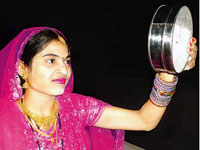In Indian Vedic culture, there are two types of fasts, namely- ‘Vrat’ and ‘Upvaas’. ‘Vrat’ and ‘Upvaas’ can be said to be the same. However, their lies a major difference between ‘Vrat’ and ‘Upvaas’. One is at liberty to eat in ‘Vrat’, whereas in ‘Upvaas’ one has to stay hungry throughout. The importance of fasting is clearly seen in the Indian culture. Women fast for the longer life of their husband and son and also for the fulfillment of any wish.
Any task is said to be fulfilled when it is done with pure heart, following the rituals. If humans complete any work by performing correct rituals and traditions, the outcome is always fruitful.
‘Vrat’ and ‘Upvas’ or ‘Upvaas’ can further be subdivided into two categories- ‘Kaamya’ and ‘Nitya’. ‘Kaamya’ are those that are kept for the fulfillment of a certain wish. While, ‘Nitya’ fasts are those, that are kept solely for devotion. Fasts have a great role in making the human life successful.
Sages have recommended following a lot of rituals and rules while observing fast. However, these can rarely be followed. Let us know more important facts that everyone must know about ‘Vrat’ and ‘Upvaas’. These facts will certainly prove to be a helpful guide in the future.
- The purity of mind and body is necessary while observing fast. Take proper care of hygiene and wear washed clothes.
- Offer prayers at clean and pleasant environment.
- During fast, emphasis is laid on vow. Before observing fast, take a proper care of the concentration of mind.
- Those who observe fast must take proper care that if the fast is left incomplete due to anger, greed, laziness or attachments, then abstain from eating for 3 consecutive days and take up the fast again. If you have taken a vow, do everything possible to fulfill it.
- When the duration of fast is completed, perform the rituals for completion of the fast. One will not get any benefits if the rituals are not performed.
- Most of the people eat tonnes of food prior to fasting, which results in bad health. Religious books have criticized this habit. The fast does not succeed if this practice is prevalent in the one who is observing fast.
- Applying ‘Ubtan’ on hairs and body is prohibited while observing fasts. Use of cosmetic products is also prohibited.
- One who is observing fast must refrain from travelling on ox, camel and donkey.
- Before and while fasting, fried eatables must not be consumed.
- Nails must not be cut while fasting. Consumption of ‘paan’ and tobacco is also prohibited.
- Stealing, speaking lies, cheating, betraying etc must not be done while fasting. Such habits must be sacrificed and instead, forgiveness, pity, worshipping, purity and self control must be taken up.
- If a woman gets her menstruation, even in that case the fast should not be given up and must be continued till the end.
- During ‘Vrat’, ‘Upvaas’ and ‘Shraddha’, abstain from doing ‘Datun’. If doing ‘Datun’ is necessary then gargle for 12 times and finish it.
- If a fast ends abruptly due to some reason, give a cow in charity and resume the fast.
- While performing ‘Havan’, ‘Aahuti’ must be given with the ‘Ghee’ made from pure milk of a cow.
- Spend only that money that is earned from doing hard work. Money earned by stealing or by taking loan does not reap good results.
- If a vow is taken to observe fast for longer period, in that case ‘Sutak’ caused by birth and death do not come into effect.
- The one who is fasting should perform ‘Aachman’ before performing anything. Otherwise, the fast goes in vain.
- A wife should only fast with the consent of her husband. If a fast is kept against the will of husband, it results into the shorter life of the better half.
- Eating someone else’s food is prohibited in fasting. It is considered that whoever’s food you eat, the result of fast also goes to his account. If you eat someone else’s food during ‘Teerth’, the virtues as well, goes to the other’s account.
- Fast must be commenced during a good period of time. Fasting during’ Bhadra Nakshatra’ and ‘Malmaas’ is prohibited.

2 comments:
Hi This is very nice Blog, good Books and products
Vaibhav Lakshmi Vrat Books
We are provide religious products Shirdi sai vrat katha, Sai vrat katha, Lakshmi Vrat Books, Vaibhav Lakshmi Vrat Books, 108 Rudraksha Mala Beads
Meditation, Rudraksha Japa Mala, Ankle Bells on string, Kathak Ghungroo pair, 25 brass bells on each string, Shubh Dhan Varsha Yantra, Shubh Dhan
Varsha Yantra Govinda, Navgraha, Shanti yantra on copper plate, Navgraha Shanti yantra
You can purchase more products on edivineshop.com
Thanks
Hi You gives The Good Product I likes Your Deal
We Have Also This Product Shub Dhan Versha Yantra
This Is Very Use Full For Any Person With Faimaly Always Give Good Efects Ns Get More Religious Products On Edivineshop.com
You can Get In 2999 Rs Only
Post a Comment